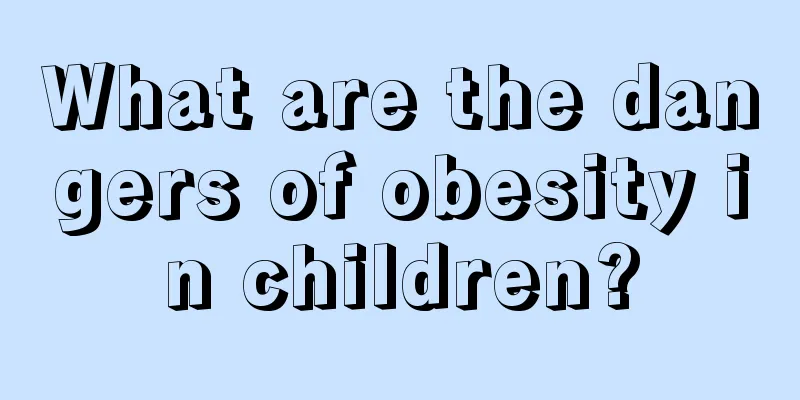What to do if your baby's stomach is rumbling?

|
In life, babies often have problems of one kind or another, and they may have some physical problems. Some babies may have gurgling stomach sounds, and many parents worry that this may be a sign of gastrointestinal problems. In order to better protect the baby's health, we need to understand some knowledge in this area. This requires us to figure out what is going on. So what's going on when your baby's stomach makes gurgling sounds? 1. Gurgling is the baby's stomach and intestines adapting to the environment The fetus is sterile in the mother's body, so the fetus' intestines are sterile! After birth, the baby starts to drink milk instead of amniotic fluid, so the baby's intestines begin to come into contact with outside bacteria! There are billions of bacteria in the intestines of a normal human body, and 99% of these bacteria are probiotics, that is, bacteria that are beneficial to the human body. If people lack the protection of these probiotics, they are vulnerable to the other 1% of conditional pathogens and pathogens! Therefore, in the process of the baby's intestines going from sterile to establishing a normal flora, there may be an imbalance in the proportion of bacteria, especially when there are more bacteria in the intestines that can decompose food and produce gas, there will be more gas in the baby's intestines! Therefore, they will fart frequently! Therefore, only by helping the baby establish a normal flora environment with a normal bacterial ratio and ecological balance as soon as possible, and letting probiotics occupy a dominant position, this situation will naturally improve! 2. Other reasons for baby's bloating 1. Diet is the most important: If the baby is breastfeeding, the mother should check her eating habits. Did you eat corn or spicy cold noodles for lunch today? Maybe they are the culprits that made your baby's stomach uncomfortable in the afternoon! If you suspect that your eating may be the culprit, then breastfeeding mothers should eliminate those suspicious foods, such as beans, cauliflower and spicy foods from your daily diet, and then observe whether your child's symptoms improve at any time. "If the child's symptoms continue to wax and wane while the mother is on a diet, breast milk is not the cause of the gas," says Joseph Levy, MD, a pediatric gastroenterologist at New York-Presbyterian Hospital in the United States. However, if the child's gas is relieved, the mother should stay away from the suspected foods for a while before eating again. In addition, if breast milk contains too much sugar, the sugar will over-ferment in the baby's stomach and easily cause the baby to have intestinal bloating (also including loose stools, frequent stools, more foam, and a strong sour taste). At this time, the mother should pay attention to limiting her sugar intake. If your child is formula-fed, you can try a different brand of formula. When choosing milk powder, you should pay special attention to the nutritional formula printed on the packaging bag. Lactose-free, soy-free or hypoallergenic formula milk powder may help reduce your child's tummy ache. Of course, even if you change the milk powder, it will take at least two weeks to see the effects. In addition, certain solid foods may also cause belching and bloating. For example, whole grains (have you added corn soup, chestnut puree, etc. to your baby's complementary food to increase nutrition?), vegetables (such as pea puree, soybean puree), etc. all contain fiber that can cause intestinal bloating. Most pure fruit juices, such as apple, pear, apricot, etc., which contain high concentrations of sugar, can also cause poor gas condensation in the baby's abdomen. Solution: The best way to identify the culprit that's causing your baby's bloating is to eliminate one food from his or her diet for a few days at a time, observe how the baby reacts, and then slowly reintroduce the food. 2. Eating method Sometimes, the key to the problem is not what the baby eats, but how the baby eats. In the case of breastfeeding, if the baby's mouth is not placed properly on the mother's breast when the baby is feeding, the baby may inhale too much air, resulting in burping or bloating. The correct posture is to have the child's face facing the breast (rather than at an angle) to ensure that his mouth covers the entire nipple and areola. Babies who are bottle-fed are more likely to take in excess air. Dr. Susanna Nelson of Children's Memorial Hospital in Chicago said: "When the child is drinking milk, if you hear a bubbling sound or see milk flowing out from the corners of the child's mouth, it is obvious that the child is not holding the nipple very tightly." You should try to position the baby's head at 45 degrees and keep the bottle tilted accordingly so that the nipple is always full of milk. If your baby has good swallowing ability, you can also make the hole of the nipple smaller to reduce the amount of air he inhales while drinking milk. 3. The vicious cycle of crying A baby's depression often makes his stomach pain worse. Stephen Paul Wedge, a professor of pediatrics at the University of Virginia, pointed out: "Children swallow a lot of air when they cry." This will create a vicious circle: once the baby starts crying, he will often have bloating due to hiccups, and bloating will further cause physical discomfort, making the baby cry even more. Once the baby's stomach starts to growl, after we understand the above knowledge, we need to figure out what is causing it. If none of the above reasons are present, we must go to the hospital for diagnosis of the disease. After diagnosing the disease, it is important to treat it so that your baby can have a healthy body. |
<<: What is the cause of the three-year-old baby's stomach pain?
>>: What are the folk remedies for children's cold and fever?
Recommend
What are the easiest ways to correct stuttering in children?
As we all know, stuttering is a problem we often ...
What to do if your baby has mumps and fever
Don’t think that mumps is just an inflammation ca...
When does a child's fontanelle close?
According to the editor's understanding, newb...
What should I do if hernia recurs in children?
In life, many children suffer from pediatric hern...
What to eat for a nine-month-old baby with anemia
When the baby is still young, mom and dad should ...
What causes nail shedding in children?
As children grow and develop, we often encounter ...
A brief discussion on children's fever recipes
Taking care of a child is a very hard job, which ...
What are the types of infantile hemangiomas?
We all know that sometimes insufficient knowledge...
What to do if your baby has milk rash on his face? Take these measures
Many parents have encountered milk rash on their ...
Eye twitching
In everyone's impression, children are partic...
What to do if your child has a bad constitution
As economic life becomes more and more prosperous...
How much milk should a newborn baby drink?
The growth and development of newborns is an issu...
What is fundus examination for premature infants?
As the name suggests, premature babies are childr...
What is the reason why the baby's belly rises and falls when sleeping?
In daily life, many parents will find that their ...
What to do if your newborn's butt is red
Newborns metabolize more frequently every day, wh...









